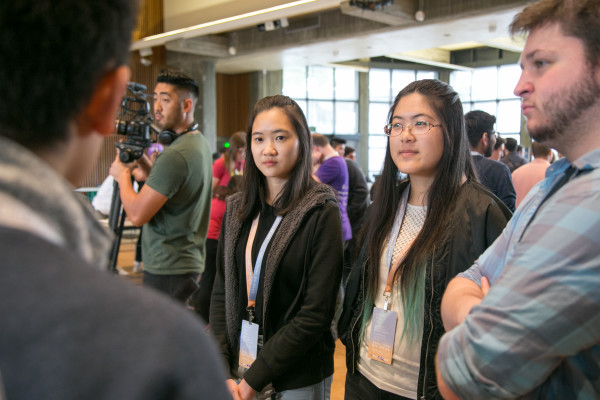Amy Ru, 21

Amy was terrible at math growing up, so she assumed she would have no penchant for anything STEM-related. It wasn’t until college that she heard about hackathons, and the thought of being a “hacker” gave her the James-Bond-esque vibes that she was itching to explore. As a non-STEM major, she was initially intimidated by building projects with random teammates, so she signed up as a volunteer at SD Hacks to snoop on other people’s projects. Amy was impressed by the projects attendees had built in 36 hours, and she wanted to see if she could do it herself. She attended her next hackathon as a hacker, and after her project won a prize, she felt motivated to keep attending more events. Amy went to 18 events her freshman year at university and was motivated to spend every weekend learning how to code—she says her 18-year-old self was “built differently.”
The first computer science class Amy audited had three girls. During her freshman year at university, she tried to sneak into an upper-level computer science course, but the professor immediately pointed at her and said, “I know you’re not in my class because there are only two girls in this class.”. The underrepresentation of women in computer science can set a daunting scene for women who want to get into coding, but hackathons such as TreeHacks and AthenaHacks allowed Amy to comfortably be herself and unapologetically explore her interests. At her first few hackathons, Amy hid her major because she thought her teammates wouldn’t take her seriously or let her code, but at TreeHacks, after sheepishly telling her teammates she was a business major, they responded, “cool,” and it turned out that none of them were computer science majors either. Amy took STEM classes at school that she was interested in, but she often felt alone among all the computer science students so her experience at TreeHacks was welcoming and comforting. AthenaHacks was also a strange yet amazing experience for Amy to see all the womxn hackers—there was an unspoken sense of solidarity as they were all minorities in technology, but they belonged there. At these hackathons, she never felt the need to prove her credibility and she found a beautiful and welcoming space to create in.
Amy joined the hackathon organizing team at her university to carve out the previously-non-existent niche for hackers outside the computer science major and women. Amy believes a hackathon’s organizers should reflect the hackers they want to attend the event, and many non-STEM majors and female hackers attended SLO Hacks because they saw her running the event. After hosting several hackathons, Amy found another way to give back to the hackathon community as managing director of Poly Canyon Ventures, her school’s non-profit student-run venture fund. The fund annually gives grants, investments, and guidance to student startups that win Camp PolyHacks’ cleantech hack category, and being able to financially support hackers means a lot to her. Some funded projects includes Leoco, a web extension that lets users shop locally to reduce carbon emissions, TrashTalk, a sustainability platform where users compete against each other by collecting the most trash to win prizes, and Remit, a borderless P2P payment system not bound by phone model, OS, or internet due to its use of blockchain and SMS (who went on to demo the project for cryptocurrency developer Xpring’s Board of Directors). She is currently working on launching an Opportunity Fund within Poly Canyon Ventures to invest in talented hackers and entrepreneurs that are minorities in tech; only 10% of venture capital deals go to women, people of color, and LGBTQIA+ founders, so Amy wants to help make that number grow. At MLH Hackcon VIII, Amy gave a presentation about empowering underrepresented hackers, which you can check out here.
Amy feels like she embodies the hacker persona while defying its stereotypes: she is a scrappy, resourceful builder who collaborates with other caffeine-fiends to build projects that can change the world. Amy has gained a lot from the hackathon community, learning how to code from MLH Hackathons, making close friends through organizing, and overcoming insecurities stemming from imposter syndrome in the tech space. Mentors and other hackers showed Amy that it’s really okay to channel her inner “tech-bro,” building video games and investing in stocks, while still enjoying “non-tech-bro” things like baking and fashion. Amy plans to continue giving back to the hacker community by mentoring female hackers at hackathons, recruiting non-STEM majors on organizing teams, funding student startups, and ultimately, shifting the perspective of what it means to be a “hacker.”
Amy’s dream after graduation is to become a full-time product manager in the Bay Area, despite how difficult it is to break into product management from a non-engineering background. Joining the hacker community taught her the technical knowledge needed to facilitate productive conversations with fellow engineers. She sees this as the beauty of hackathons, that even a business major like herself can walk into a room full of bright minds and soylent, and come out with new friends, skills, and even a startup idea.
Amy’s favorite project to work on was SURGE.on, a VR app that democratizes medical center career paths for students in underrepresented communities. No one on her team had ever touched VR before, but Amy had played Beat Sabers once on an Oculus and desperately wanted to try VR development. After borrowing an Oculus, they struggled to set up the VR environment until 4 hours before the deadline, where they (in true hacker fashion) downed three shots of espresso to demo a successful prototype to the judges. The project won first place and the whole experience felt like a fever dream, but it led Amy to realize that she could build more than just a website.
Quick Facts

Amy Ru, 21

Amy was terrible at math growing up, so she assumed she would have no penchant for anything STEM-related. It wasn’t until college that she heard about hackathons, and the thought of being a “hacker” gave her the James-Bond-esque vibes that she was itching to explore. As a non-STEM major, she was initially intimidated by building projects with random teammates, so she signed up as a volunteer at SD Hacks to snoop on other people’s projects. Amy was impressed by the projects attendees had built in 36 hours, and she wanted to see if she could do it herself. She attended her next hackathon as a hacker, and after her project won a prize, she felt motivated to keep attending more events. Amy went to 18 events her freshman year at university and was motivated to spend every weekend learning how to code—she says her 18-year-old self was “built differently.”
The first computer science class Amy audited had three girls. During her freshman year at university, she tried to sneak into an upper-level computer science course, but the professor immediately pointed at her and said, “I know you’re not in my class because there are only two girls in this class.”. The underrepresentation of women in computer science can set a daunting scene for women who want to get into coding, but hackathons such as TreeHacks and AthenaHacks allowed Amy to comfortably be herself and unapologetically explore her interests. At her first few hackathons, Amy hid her major because she thought her teammates wouldn’t take her seriously or let her code, but at TreeHacks, after sheepishly telling her teammates she was a business major, they responded, “cool,” and it turned out that none of them were computer science majors either. Amy took STEM classes at school that she was interested in, but she often felt alone among all the computer science students so her experience at TreeHacks was welcoming and comforting. AthenaHacks was also a strange yet amazing experience for Amy to see all the womxn hackers—there was an unspoken sense of solidarity as they were all minorities in technology, but they belonged there. At these hackathons, she never felt the need to prove her credibility and she found a beautiful and welcoming space to create in.
Amy joined the hackathon organizing team at her university to carve out the previously-non-existent niche for hackers outside the computer science major and women. Amy believes a hackathon’s organizers should reflect the hackers they want to attend the event, and many non-STEM majors and female hackers attended SLO Hacks because they saw her running the event. After hosting several hackathons, Amy found another way to give back to the hackathon community as managing director of Poly Canyon Ventures, her school’s non-profit student-run venture fund. The fund annually gives grants, investments, and guidance to student startups that win Camp PolyHacks’ cleantech hack category, and being able to financially support hackers means a lot to her. Some funded projects includes Leoco, a web extension that lets users shop locally to reduce carbon emissions, TrashTalk, a sustainability platform where users compete against each other by collecting the most trash to win prizes, and Remit, a borderless P2P payment system not bound by phone model, OS, or internet due to its use of blockchain and SMS (who went on to demo the project for cryptocurrency developer Xpring’s Board of Directors). She is currently working on launching an Opportunity Fund within Poly Canyon Ventures to invest in talented hackers and entrepreneurs that are minorities in tech; only 10% of venture capital deals go to women, people of color, and LGBTQIA+ founders, so Amy wants to help make that number grow. At MLH Hackcon VIII, Amy gave a presentation about empowering underrepresented hackers, which you can check out here.
Amy feels like she embodies the hacker persona while defying its stereotypes: she is a scrappy, resourceful builder who collaborates with other caffeine-fiends to build projects that can change the world. Amy has gained a lot from the hackathon community, learning how to code from MLH Hackathons, making close friends through organizing, and overcoming insecurities stemming from imposter syndrome in the tech space. Mentors and other hackers showed Amy that it’s really okay to channel her inner “tech-bro,” building video games and investing in stocks, while still enjoying “non-tech-bro” things like baking and fashion. Amy plans to continue giving back to the hacker community by mentoring female hackers at hackathons, recruiting non-STEM majors on organizing teams, funding student startups, and ultimately, shifting the perspective of what it means to be a “hacker.”
Amy’s dream after graduation is to become a full-time product manager in the Bay Area, despite how difficult it is to break into product management from a non-engineering background. Joining the hacker community taught her the technical knowledge needed to facilitate productive conversations with fellow engineers. She sees this as the beauty of hackathons, that even a business major like herself can walk into a room full of bright minds and soylent, and come out with new friends, skills, and even a startup idea.
Amy’s favorite project to work on was SURGE.on, a VR app that democratizes medical center career paths for students in underrepresented communities. No one on her team had ever touched VR before, but Amy had played Beat Sabers once on an Oculus and desperately wanted to try VR development. After borrowing an Oculus, they struggled to set up the VR environment until 4 hours before the deadline, where they (in true hacker fashion) downed three shots of espresso to demo a successful prototype to the judges. The project won first place and the whole experience felt like a fever dream, but it led Amy to realize that she could build more than just a website.
Quick Facts




